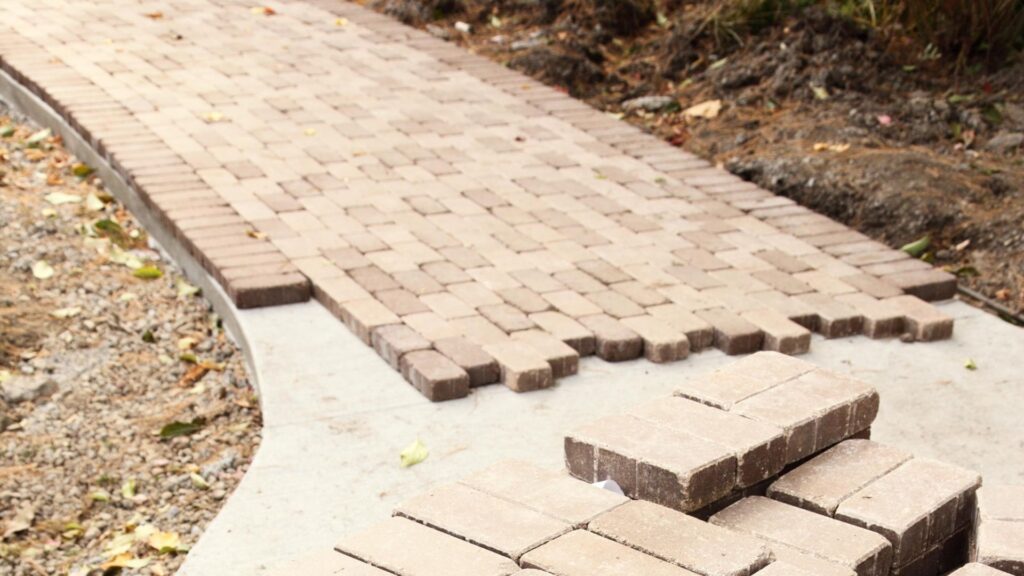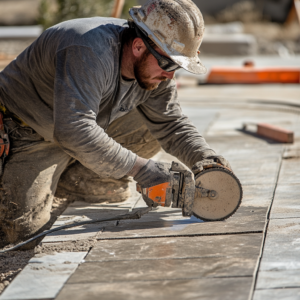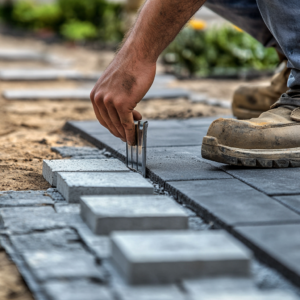If you have a concrete patio and you’re looking for renovation ideas, you probably came across this one. At some point, you probably wondered if you can install pavers over concrete.
Switching from concrete to pavers is common practice, especially if you want to improve the looks of your patio. Don’t take us wrong; concrete has positive aspects, particularly from an economic point of view. But once you’ve paid the bills, it’s reasonable to consider new ideas to enhance the aesthetics of your patio.
And in order to do that, what’s best than pavers? From the extended durability to the added beauty they provide, pavers are a wonderful choice. Plus, you can see them as an investment since homes with paver patios tend to have a higher market value.
However, many people end up discouraged by the idea that they will have to remove their concrete slabs to install pavers in their place. But what if that’s not necessary?

Jump to:
Can Pavers Be Installed Over Existing Concrete?
Yes, it’s possible, it’s not our go-to choice, but it’s faster and cheaper. That, of course, as long as the concrete is in good condition, which is a crucial point to consider. You have to evaluate the integrity of the concrete slab. Small cracks and stains won’t be a problem. Now, larger cracks will show severe signs of surface damage.
Another vital aspect to observe is whether the site has adequate drainage or not. Make sure that the area where you have installed the concrete isn’t suffering from any erosion effect. Rainwater runoff, for instance, can cause problems in the future.
The erosion process can remove the soil layers below the concrete, leading to problems ranging from cracks and small unevenness to huge craters. In a few years, even months, you can be facing severe structural damage issues on your paver patio.
With that said, installing pavers over concrete is not your best choice. One of the most evident benefits of pavers is their flexibility. Pavers are designed to be flexible with the surface. That is, they will respond much better to temperature and load variations if installed over a standard gravel and sand base.
Which Material Can You Use Between Concrete and Pavers?
Although there are other types of materials, the answer to this question comes down to two options: Sand or bituminous.
The process of installing pavers over sand and bituminous is quite similar to the typical installation. The difference is that it’s necessary to place draining holes in the lower areas, giving the water that seeps into joints a place to escape.
In general, the two materials have very similar benefits and work well. However, in places where there is heavy traffic, the use of sand alone is not recommended. That’s because the sand can shift. The bituminous set is commonly used for high impact traffic areas such as crosswalks, as it helps prevent rotational failures of the pavers.
Can You Glue Pavers To Concrete?
Yes, not only you can, but you also should consider gluing pavers, especially in the border areas. As mentioned earlier, the sand can cause a certain level of shifting. Adding mortar or glue to the perimeter pavers will minimize that issue.

How To Tell If The Concrete Is Suitable Or Not For Pavers?
If your budget allows you, you should always prefer to remove the concrete slabs. Doing so will ensure a long-lasting installation. Nevertheless, if you do decide to go with pavers over concrete, you must pay attention to the conditions of the slabs.
If they are badly damaged or in an area susceptible to problems with drainage, settling, and cracking, don’t go forward without removing your concrete. An appropriate foundation is essential for the durability of your pavers.
JSBrick has 20+ years of experience providing paver installation, supply, and maintenance services in Sarasota and surrounding cities. For a free estimate on your paving project, don’t hesitate to leave us a message or call us at your earliest convenience.



